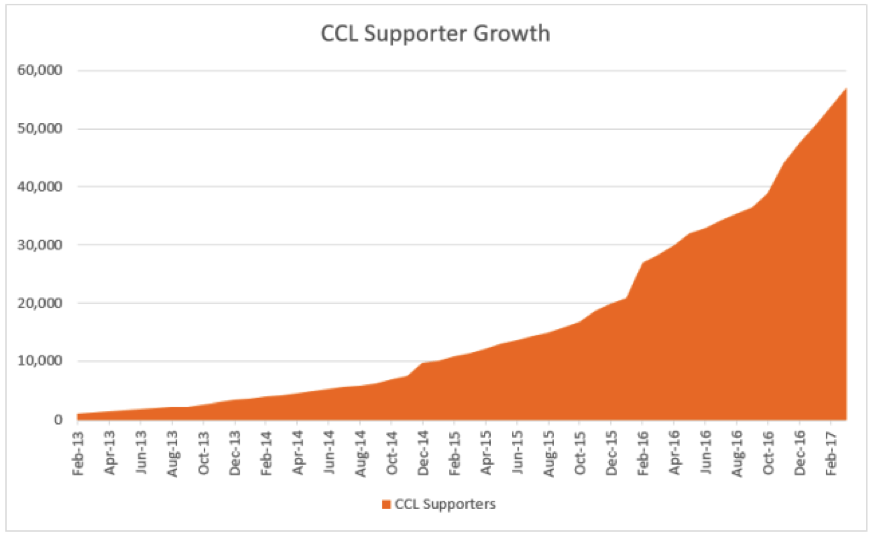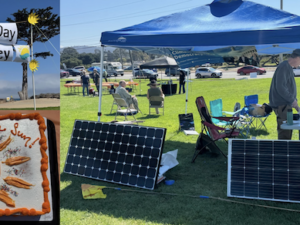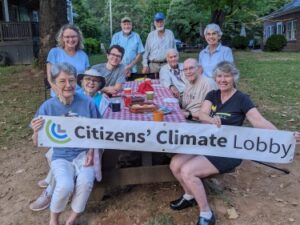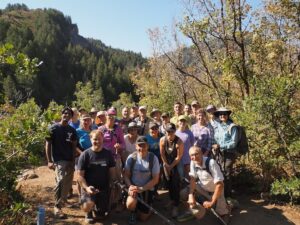By Cynthia Carau
When it comes to climate change, not every “hockey stick” graph is bad news.
Citizens’ Climate Lobby doubled its membership adding nearly 28,000 supporters in 2016, and momentum has continued into 2017.
Clearly, the ascendancy of President Donald Trump has spurred much of this activity, with more than 18,000 supporters joining since the election. While the raw numbers are exciting on their own, a closer look at these new members reveals encouraging trends – and inspiring energy.
Increase in new CCL members leaning right
In addition to sheer growth, the CCL membership is also showing some hints of demographic changes. Supporters who joined in 2016 or January 2017 were 40% more likely to identify their political affiliation as “right leaning” when compared to those who joined earlier.
One of those is Ed Fowler, a conservative who joined CCL last November. “I heard climate change denial in the election,” said Fowler, a 54-year-old engineer in San Diego, “and I’ve thought for a long time that that’s the stupidest thing to deny that it exists. The argument should be about what do we do about it, not whether the science is really right or not.”
Fowler has worked in the energy field for his whole career and always saw climate change as an “intractable problem.” When he heard about carbon fee and dividend he said “It just made sense to me. You use market forces to try and tilt the economics toward renewables and other non-polluting sources of energy.” Fowler has already started giving presentations to community groups both on the science of climate change and on carbon fee and dividend.
Increased CCL membership in rural and conservative areas
CCL is expanding its geographic reach as well. While liberal stalwart California has by far the most CCL members, the top five states with the highest per-capita membership are Montana, Wisconsin, Maine, Nebraska and Utah. CCL’s presence in such conservative strongholds may seem surprising, but some members find it’s exactly what they need.
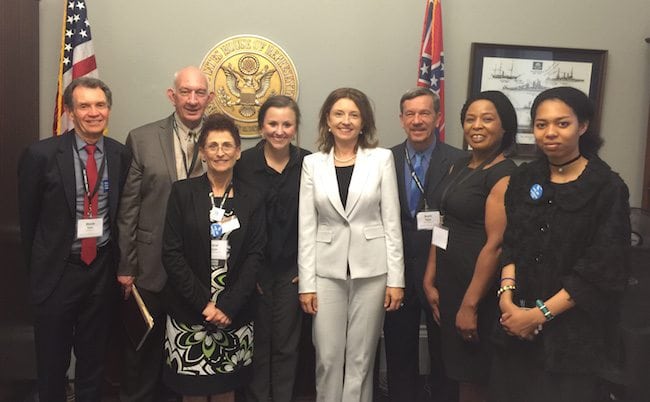
Domika Dziegielewska-Parry (in white) visits the office of Rep. Steven Palazzo (R-MS) with other CCL volunteers in Washington last June.
For Dominika Dziegielewska-Parry, 45, finding CCL was a sanity saver. She holds a PhD in environmental economics and works as an independent consultant in Jackson, Mississippi, where she says even people who believe in climate change won’t speak out. “I figured that I have nothing to lose, so I should start talking about it,”says Dziegielewska-Parry. After meticulous research, she determined that CCL offered both an economically sound solution and a helpful framework for communication and activism. “CCL was really a godsend.”
Dziegielewska-Parry started the Jackson chapter in 2016 and has seen a big response, although many of her members will not put their names on the rolls because they “fear persecution.” However, momentum seems to be on her side as she works toward forming a chapter at Millsaps College in Jackson. “There are lots of people in areas like this that don’t do anything because nobody else is doing anything. Once you put a spark, it goes.”
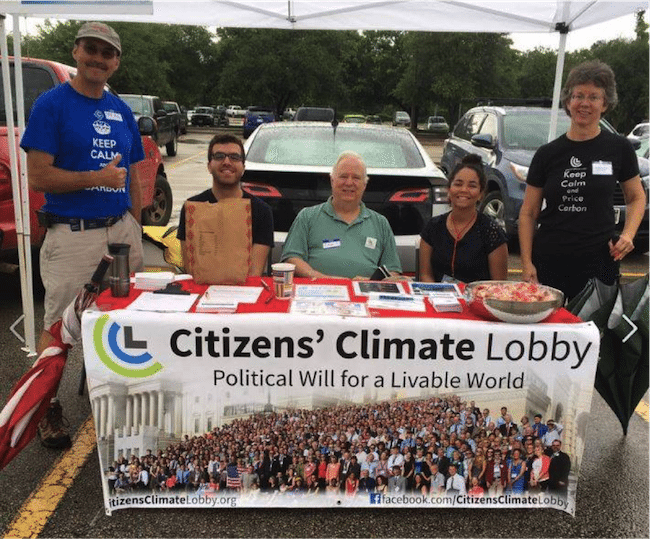
Bill Bray (at left), a member of the fast-growing chapter in The Woodlands, TX, says ““Many of the people in our chapter are out of the oil and gas industry.”
That same spark is spreading through Texas according to Bill Bray, a 58-year-old naval architect in a northern suburb of Houston. Membership in The Woodlands chapter has increased to 256, either despite its location or because of it. “Many of the people in our chapter are out of the oil and gas industry,” Bray says. “We’re scientists and engineers who understand science and aren’t afraid of it and understand there’s a problem and that we need to do something.”
On the other side of Houston, Matt Kovalski, 25, a chemical engineer in Texas, likes that CCL offers something for both parties: “The political left gets to solve climate change in a way that doesn’t disenfranchise people of lower income levels, while the right gets a solution to an environmental issue while not growing the government, and they get to benefit the economy.” Kovalski believes in CCL so much he’s started two chapters – the first while a student at Texas Tech University in Lubbock and the second after graduation in League City, Texas.
Although it was just him and one other member for quite a while, Vernon Dixon has seen an influx of new members in Hiawassee, Georgia, a town of about 550 people. “Up here it’s a beautiful part of the world,” says Dixon, 71, a retired psychiatrist. “We’re up in the mountains, it’s very picturesque. People value the beauty of the land, and I think they really care about preserving the land.”
Many Roads Lead to CCL
Although Trump’s presidency may be bringing new members in, it’s not what ultimately motivates them.
Dixon says his journey to CCL began as a spiritual experience borne out of Christian meditation. “There was just this great realization that we were one with all these people,” Dixon says. “They were our kin, everywhere. And I felt it was my duty to do what I could to make the world the best place I could.”
Two particular people motivate Bryan Hermsen, a 38-year-old software developer in Lincoln, Nebraska, who joined CCL in 2016. An article about the financial burden of climate change on millennials has him concerned. “My kids are 8 and 11,” he says. “How much worse is it going to be for them? I hate to think of them having to deal with that.”
The most interesting path to CCL may belong to, Caroline Teng, a 31-year-old sustainability consultant in Oakland, CA. She and her friends “just felt so hopeless after the presidential election,” she said. “There’s the feeling of people wanting to harness their energy and direct it toward something.” She heard about CCL from a colleague, looked on the website, and invited CCL member David Cain to give a presentation – at her birthday party.
Teng says it’s a “smart strategy” for CCL to work across party lines. “If we can crack the code on how speak about climate change and not make it so divisive, that would be a huge win for the cause.”
Here’s hoping she gets her birthday wish.
Are you a local Mainer interested in volunteering for the environment?

